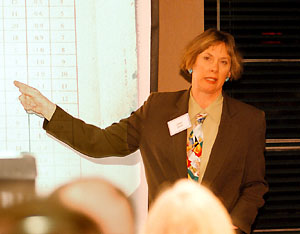This is an archived article. For the latest news, go to the Advance Homepage. For more archives, go to the Advance Archive/Search Page  | ||
|
New approach to teaching aims to establish community of learners
March 2, 1998 Changing the approach to teaching was the topic tackled by a group of more than 40 faculty members, administrators and students Tuesday evening.
The group met at the Nutmeg Grille to discuss how to encourage students to become actively involved in their own education and to establish a learning community of faculty and students. Susan Steele, vice provost for undergraduate education and instruction, said a research university is an appropriate environment for a learning community, because both faculty and students are involved in the same activity. "A research environment means faculty are always involved in learning, and learning how to learn becomes an essential part of education," she said. The evening built on a fall conference in Snowbird, Utah, attended by six UConn faculty members. The group, which has since expanded to include students and administrators - and continues to grow - is charged with leading a cultural change in the University's approach to undergraduate education. UConn is not alone. Underlying the need for transformation in higher education is the rapid pace of change in society that requires people to continue learning new information and skills long after they graduate from college. Keith Barker, director of the Institute for Teaching and Learning, said the University must effect a transformation in students "from learning from teachers to learning by themselves, for lifelong learning." Chancellor Mark Emmert said it is a difficult transition for students to recognize they have a responsibility to be engaged in the process of learning. "One of the challenges we face is that students come from conventional high school backgrounds ... expecting us to provide them with knowledge and wisdom and almost learn for them," he said. Steele, in the keynote presentation, said she grew up in the kind of learning environment where "you sat there and they talked." She said her views changed when, after 20 years' teaching, she became an administrator and found she had to change the way she tried to convince people to think differently about things. She then began to introduce her new approach into teaching. She urged faculty to test the effectiveness of their teaching, for example by testing students' knowledge at the beginning of the course and repeating the same test at the end of the semester. She also advocated asking students more about what they want from their education and then examining whether the University is helping them accomplish their goal. In small group discussions, participants brainstormed the implications of a new approach to teaching and learning. Charles Vinsonhaler, a professor of math and one of the group that attended the Snowbird conference, said one of the benefits of the new approach to learning is that students can be valuable as teachers and as research colleagues. "We owe it to ourselves to re-energize ourselves as faculty," he added. Other participants suggested practical strategies for change, including sharing teaching tips through poster sessions and via the Web, developing better ways to evaluate teaching, and modifying the reward structure to place greater emphasis on good teaching. Some said the focus on research is a disincentive to excellence in teaching. Others identified a need for more places where students can meet, in order to promote a sense of community, and a need for more scholarships to relieve students of the burden of working to support their college education. "Students need time to mull things over and time to be students," said Susan Spiggle, professor and head of the marketing department, and one of the original Snowbird group. Wrapping up the evening, Emmert said the merit system "Is not controlled by the University of Connecticut but by the professoriate of America. "Yet even without a reward, this is still the right thing to do," he said. He described it as an interesting dilemma that although the profession places greater emphasis on scholarly productivity, as an institution the University has to pay attention to the quality of education. "If nothing else we have to be pragmatic," he said. "The people who pay the bills are interested in education at the undergraduate level." Emmert, who addressed the General Assembly's appropriations committee earlier in the day, said the committee asked about the University's graduation rate, retention rate, international teaching assistants, and the nature of the educational experience at UConn. "Those are the issues they are talking about under the golden dome," he said. He added that it is teaching that makes academic pursuits possible. Taking art as an example, he said "If you don't produce great education, you're not going to be able to produce great art." Elizabeth Omara-Otunnu |

